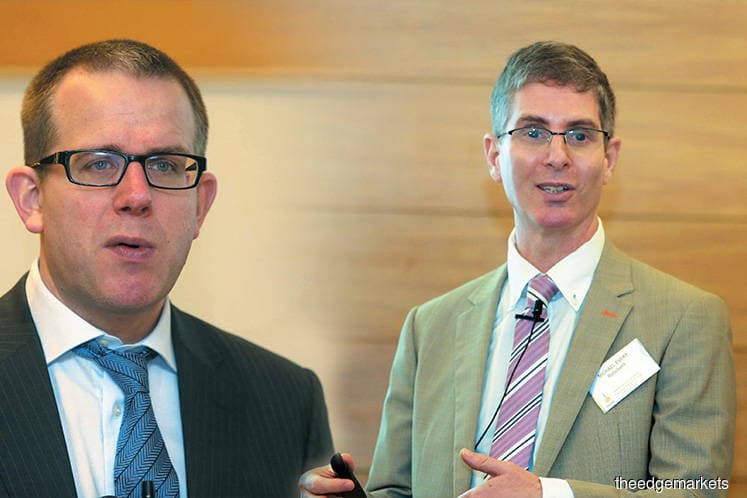
This article first appeared in Personal Wealth, The Edge Malaysia Weekly on October 2, 2017 - October 8, 2017
As global equity markets continue to trend up with volatility remaining low in recent months, investors should not get carried away by the over-optimism without noticing underlying risks, says Jan Lambregts, Rabobank’s global head of financial markets research.
While there are many indicators showing the global economy is still on a recovery path 10 years after the last global financial crisis (GFC), there are areas that are cause for concern.
Lambregts says, although unemployment rates have come down, especially in the US and Europe, labour productivity in major economies has not gone up a lot. Also, global wage growth has remained slow, which could be a reflection of those in the middle and lower classes struggling to make ends meet. As a result, this could cause further dissatisfaction to the masses globally, which would contribute to political unrest and potentially fuel anti-globalisation sentiments around the world.
In addition, commodity prices and inflation rate, measured by the Bloomberg Commodity Index and Fed five-year forward break-even inflation rate, have remained flat since 2009.
All this is happening despite some of the largest central banks having increased their balance sheets enormously since the GFC through the implementation of quantitative easing (QE) programmes. According to Rabobank research, top central banks’ assets, in general, equal 19% of their respective countries’ GDP in 2009. This percentage increased to 39% in 2017.
“There are many problems that central banks are trying to address [after the GFC]; some have been paved over and some patched up. However, the debt levels of central banks, companies and household globally have gone up, and there are problems that remain unsolved,” says Lambregts during his presentation titled “The Great Gamble: Much to win, far more to lose” at Rabobank’s Financial Market Outlook 2018 briefing.
“We told this to a lot of our clients and representatives of chambers of commerce, but somehow, we got a pushback from them. They said: ‘Hey, things are going well now.’ And they want to believe it. However, if you hold up the mirror and look at it, the risks are growing,” he adds.
“These [factors] are why I’m leaning towards a more pessimistic viewpoint. It doesn’t mean that the market will collapse soon. But yes, we are reaching a tipping point.
“Everyone’s a winner today, but how long can it last?”
Other risks also include the Brexit negotiation, US investigation into Chinese intellectual property theft under the Trade Act of 1974 (which could trigger a trade war) and rising tension between the US and North Korea due to the latter’s nuclear weapons tests.
Michael Every, Rabobank’s senior Asia-Pacific strategist, says the Federal Reserve has just embarked on its QE unwinding programme. This is another “gamble” by the Fed, the impact of which will likely be seen in the next 12 months or so.
“The Fed will start running down its balance sheet, which now stands at US$4.5 trillion (RM18.9 trillion). They are crossing the Rubicon [as there are many problems still existing in the global economy]. They say they’re going to do it slowly, and we are going to see at what pace this will be done and its impact on the markets,” he says.
Every says real wage growth is the key data to watch moving forward as the Fed starts unwinding its QE programmes. If real growth in the global economy is back, which will benefit the masses, this means the QE programmes experiment by the central banks is a success. At the same time, the global economy has to show continuous growth and governments around the world have to implement reforms and fiscal stimulus while the unwinding is in progress.
However, if real wage growth remains flat or falls further and governments around the world implement fiscal austerity (instead of stimulus) and have not instituted reforms, the consequences will be bad. And if the renminbi — one of the most widely used currencies in global trade finance that has not weaken substantially in the beginning of the year partly due to capital controls implemented by its central bank — weakens substantially, it could lead to foreign exchange and trade wars.
“Basically, major central banks are trying to tell you that QE is the medicine that you took when you were sick,” Every says. “Now we are well and we don’t need the medicine anymore. If markets remain healthy and interest rates slowly increase amidst some volatility, their gamble pays off. But if it doesn’t, it means that it is a medicine you have to keep taking over time. Then we are in real trouble.
“So, whether the global economy has a structural or chronic illness, we will find out in the next 12 months or so.”
Save by subscribing to us for your print and/or digital copy.
P/S: The Edge is also available on Apple's AppStore and Androids' Google Play.